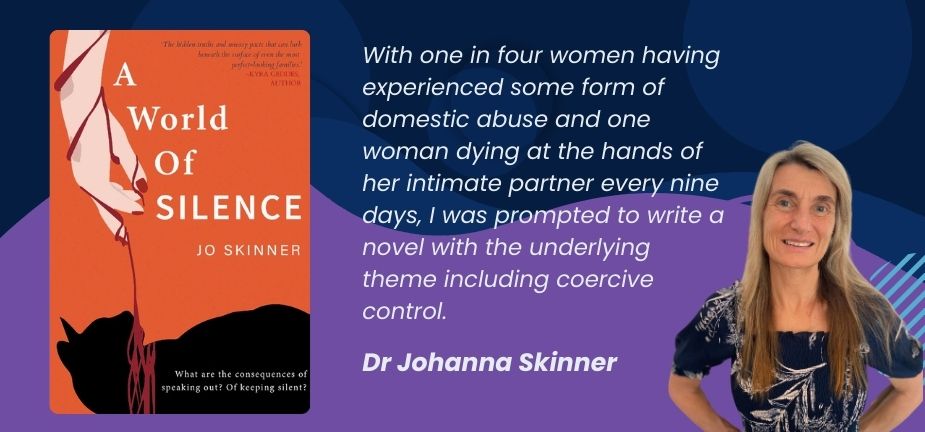Brisbane-based GP, Dr Jo Skinner has contributed this important piece about domestic violence. The story of female friendships with an underlying theme of coercive control is the basis of her new novel A World of Silence. Dr Skinner will be on a panel discussing these themes at the Sunshine Coast Hinterland Writers Festival on 4 May and will attend a couple of book launches in Brisbane – 10 May at Avid Reader and 5 June at Books at Stones.
A World of Silence
There are some events will forever stay with us. We remember exactly where we were, what we were doing, and the smallest trigger can remind us of every detail. The murder of Hannah Clarke and her three children is a day that is still vivid for me. The surgery where I work is a mere two streets away and I still recall the acrid smell filling my room. I closed the windows imagining there was a house fire and crossing my fingers that no one had been hurt. I was seeing one of my regulars, an elderly lady, Meg, who looked shocked and said, ‘Isn’t it terrible.’
I didn’t learn the truth until I watched the news that evening and realised the true horror that occurred in a suburban street. On 26 May 2025 five years after Hannah and her children were murdered, coercive control will become a criminal offence in Queensland. This is a welcome and important change in legislation, but unfortunately, will not be enough to deter men who use intimidation, humiliation, gas lighting and technology facilitated abuse including surveillance and tracking to exert power and dominance.
Twenty years ago, I worked in a regional town in New South Wales and was on call twenty- four seven to do the forensic examinations of women who had experienced sexual assault. What shocked me the most was how few women presented – only six in two and a half years – and of these not one pressed charges. We know from Australian Bureau of Statistics data that nearly one quarter of women are the victims of sexual assault from the age of fifteen, with 92% not reporting the incident.
One of my patients, Fiona, works with victims of all forms of domestic violence and she relayed an event that really shocked me. A client rang the service, terrified. She explained that her ex-partner had been released from prison and when she arrived home there was a knife stuck in her front door. The new counsellor told her, you are overreacting, it could have been anybody.
Fiona explained that this reflects social attitudes amongst men and women, who still believe that women are often responsible and carry the blame for domestic abuse.
The National Community Attitudes to Violence Against Women survey done every four years shows that we have a long way to go when it comes to changing deeply held beliefs. These are the findings from the 2021 survey.
- 34% of people believe it’s common for sexual assault allegations to be used as a way of ‘getting back at men’, with 24% believing allegations are due to women regretting a consensual sexual encounter.
- 25% believe that it’s biologically difficult for men to regulate their sexual behaviour because once aroused, they may not realise a woman doesn’t want to have sex.
- 7% believe that only ‘genuine’ victims report sexual assaults immediately.
- 7% think if a woman meets up with a man she met on a dating app, she is partly responsible if he forces sex on her.
- 10% believe that women often say ‘no’ when they mean ‘yes’.
- 21% believe that if a woman sends a nude image to her partner, she is partially responsible if he shares it without permission.
- 10% regard non-consensual touching as understandable because some women are so sexual in public.
I often think of the many women I have seen as a GP who have admitted to being in abusive relationships. Most of them confide years, sometimes decades after the event and have never told anyone else, anxious about the response, worried that others will blame them for what happened. I know, based on the statistics that many of my regulars are in abusive relationships but not found the courage to speak about it.
With one in four women having experienced some form of domestic abuse and one woman dying at the hands of her intimate partner every nine days, I was prompted to write a novel with the underlying theme including coercive control. I feature Fiona’s knife incident on the first page, but the rest of the novel is a fictional story about three women which tells the truth about what happens in our suburbs behind closed doors.
It is shocking that twenty years after I was on call to do the forensic examinations of women after assault that nothing has changed. In fact, things seem to be getting worse with an increasing number of women the victims of coercive control, defined as a pattern of behaviour used by a perpetrator to maintain control over another person. It is nearly always present in domestic abuse but is more easily dismissed as the behaviours are subtle, pervasive, and cumulative. It can be difficult to detect by outsiders and even family and friends are often unaware of what is really happening.
We need to go further than legislation, critical though that is. While sexist comments and behaviour form part of our collective consciousness, women will not come forward. Our silence about abuse in all its ugly forms protects perpetrators. It is up to every one of us, in our homes and schools, in the workplace and in the community to make it clear than misogyny, in all its ugly forms, is unacceptable. As a community, we need to create a world where a man who tells sexist jokes, makes salacious remarks about a woman, or posts compromising material without her consent, is pulled up and ostracised and forced to hang his head in shame. Imagine how things would change if the perpetrator were excluded by his peers and forced to hang his head in shame.
Until that happens, I will attempt to manage the chronic mental health issues of women who carry their shame in a system ill-equipped to deal with complex trauma. I will work within a system where victims continue to carry guilt and blame when their sense of self and rights over their body are breached. I will continue to write about it and talk about it, but it feels woefully inadequate.
My novel, A World of Silence is released on 14 April 2025. It is available at Hawkeye Publishing and most good bookshops.
I also have a webpage and write a monthly newsletter with articles about running, writing, some GP wisdom and a book review.

By Dr Johanna Skinner
The Australian Federation of Medical Women (AFMW) is a not for profit, politically neutral, non sectarian, non government organisation that seeks to improve the health of all Australians, especially the health of women and children.
Events and Updates coordination by AFMW, on behalf of the Australian Federation of Medical Women (AFMW), its affiliated Australian state and territory partners and international networks and supporters. If you have an update or event you would like to share with us for Australian medical women, please contact us with details. Thank you.

